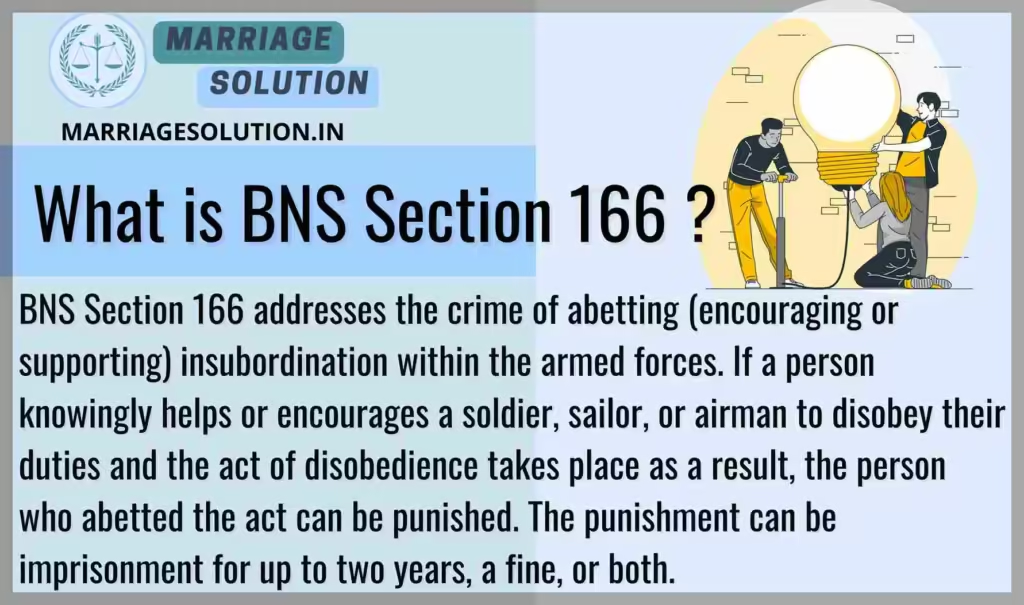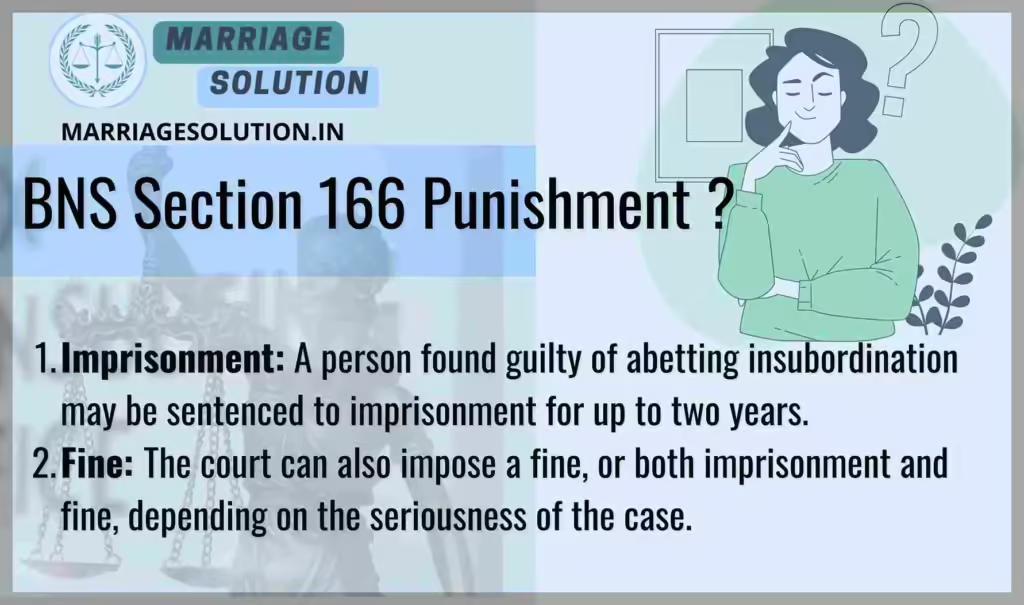Introduction of Section 166 BNS
166 BNS criminalizes the abetment of acts of insubordination by members of India’s armed forces (Army, Navy, Air Force). If a civilian or service member encourages, assists or instigates a soldier, sailor or airman to disobey lawful orders and that disobedience occurs as a result, the abettor can face imprisonment for up to two years, a fine, or both. The provision is aimed at safeguarding the chain of command and military discipline by deterring outside influence or internal provocations that could undermine operational effectiveness.
The Bharatiya Nyaya Sanhita (BNS) Section 166 replaces the old Indian Penal Code (IPC) Section 138.
What is BNS Section 166 ?
BNS Section 166 addresses the crime of abetting (encouraging or supporting) insubordination within the armed forces. If a person knowingly helps or encourages a soldier, sailor, or airman to disobey their duties and the act of disobedience takes place as a result, the person who abetted the act can be punished. The punishment can be imprisonment for up to two years, a fine, or both.

Abetment of insubordination BNS 166
“Whoever abets the commission of an act of insubordination by an officer, soldier, sailor or airman of the Army, Navy or Air Force of the Government of India, shall, if such act of insubordination is committed in consequence of that abetment, be punished with imprisonment of either description for a term which may extend to two years, or with fine, or with both.”
1. Who is Covered?
This section applies to any person (civilian or military) who encourages, supports, or helps a soldier, sailor, or airman commit insubordination (disobedience of lawful orders).
2. What is the Offense?
- Encouraging or supporting an act of disobedience or refusal of orders by armed forces personnel.
- The act of insubordination must actually occur for punishment to apply.
3. Essential Ingredients
- Abetment: The person must aid, encourage, or provoke the disobedience.
- Act of Insubordination: The soldier, sailor, or airman must disobey their lawful superior.
- Causation: The disobedience must happen because of the abetment.
4. Punishment
- Imprisonment: Up to 2 years
- Fine: As decided by the court
- Or Both
5. Nature of the Offense
- Cognizable → Police can arrest without warrant.
- Bailable → Accused can apply for bail.
- Non-compoundable → Cannot be settled privately.
- Triable by Any Magistrate → Any Magistrate can hear the case.
Examples under BNS Section 166
Example 1:
A civilian convinces a soldier not to obey his commanding officer’s order during a drill. The soldier disobeys. The civilian is guilty under Section 166 and may face jail or a fine.
Example 2:
A naval officer’s colleague tells him to ignore a mission order. The officer follows this advice and refuses duty. The colleague abetted insubordination and is liable under Section 166.
Why BNS Section 166 is Important
- Protects Military Discipline → Ensures that no one encourages soldiers to break command structures.
- Preserves National Security → Insubordination can weaken military readiness and discipline.
- Targets External Influence → Prevents civilians or others from luring soldiers away from duty.
- Acts as a Deterrent → Punishment discourages attempts to interfere with the chain of command.
Section 166 BNS Overview
BNS Section 166 addresses the crime of abetting insubordination by military personnel in the Army, Navy, or Air Force. If someone helps or encourages an officer or soldier to disobey their duties and this act takes place as a result, the person who aided the disobedience can be punished. The law allows for up to 2 years of imprisonment, a fine, or both.
Key Points of BNS Section 166
- Abetment of Insubordination:
- This section deals with cases where an individual actively supports or encourages military personnel (soldiers, sailors, or airmen) to disobey lawful commands from their superiors.
- The encouragement must lead to the actual act of insubordination for the abettor to be held liable.
- Applicable to Military Personnel:
- This law is specifically meant for military personnel serving in the Army, Navy, or Air Force. It ensures that the discipline within these forces is maintained and that external influences do not encourage disobedience.
- Act of Insubordination Must Occur:
- The punishment under this section applies only if the act of insubordination actually happens due to the encouragement or abetment by the person involved.
- Punishment:
- If found guilty of abetting the insubordination, the accused may face imprisonment for up to two years, a fine, or both. This is intended to act as a deterrent against encouraging military disobedience.
- Imprisonment and Fine:
- The punishment is designed to be flexible, offering a combination of imprisonment and/or fine, depending on the severity and circumstances of the case.
- Cognizable Offense:
- Since it is a cognizable offense, the police have the authority to arrest the accused without the need for a warrant. This allows for immediate legal action to be taken to maintain military discipline.
- Bailable Offense:
- The offense is bailable, which means the accused can apply for bail and does not necessarily need to remain in custody while awaiting trial.
- Non-Compoundable:
- This offense is non-compoundable, which means the case cannot be privately settled between the parties. It must be decided by a court.
- Tried by Any Magistrate:
- The trial of cases under Section 166 can be handled by any magistrate in a court of law, ensuring the case can proceed at any level of the judiciary.
- Importance of Military Discipline:
- The purpose of Section 166 is to maintain the integrity and discipline of the Indian Armed Forces. By punishing those who attempt to influence military personnel to act against their duties, the law ensures the chain of command remains strong and effective.
BNS Section 166 : Examples
Example 1:
A civilian friend of an Army soldier encourages him to disobey a direct order from his commanding officer. The soldier, influenced by the friend’s encouragement, refuses to follow the command. The civilian friend can be punished under Section 166 for abetting the insubordination, and could face imprisonment or a fine.
Example 2:
A sailor in the Indian Navy is convinced by a colleague to ignore a command during a mission. Because the colleague influenced the sailor’s decision to act against orders, the colleague can be held responsible under Section 166, and may be sentenced to jail or fined.
BNS 166 Punishment
Imprisonment: A person found guilty of abetting insubordination may be sentenced to imprisonment for up to two years.
Fine: The court can also impose a fine, or both imprisonment and fine, depending on the seriousness of the case.

BNS 166 bailable or not ?
BNS Section 166 is a bailable offense, which means the accused can apply for bail and may not necessarily remain in custody until the trial concludes.
Comparison – BNS Section 166 vs IPC 138
| Section | What it Means | Punishment | Bail | Cognizable? | Trial By |
|---|---|---|---|---|---|
| BNS Section 166 | Addresses abetment of acts of insubordination by soldiers, sailors, or airmen of India’s armed forces. If disobedience occurs because of such abetment, the abettor is punishable. | Imprisonment up to 2 years, or fine, or both. | Bailable (accused can apply for bail). | Cognizable (police can arrest without warrant). | Any Magistrate. |
| IPC Section 138 (Old Law) | Penalized abetment of insubordination by any officer, soldier, sailor, or airman under the Indian Penal Code. Focused on maintaining discipline within the armed forces. | Imprisonment up to 2 years, or fine, or both (similar to BNS 166). | Bailable (same as under BNS 166). | Cognizable offence (warrant not required for arrest). | Any Magistrate. |
| Key Difference: BNS Section 166 refines and modernizes IPC Section 138 by clearly defining that punishment applies only when the act of insubordination actually occurs as a result of abetment. It simplifies language and maintains the same penalty to preserve discipline within the armed forces. | |||||
BNS Section 166 FAQs
What is BNS Section 166?
It covers the abetment of acts of disobedience or insubordination by soldiers, sailors, or airmen in the Indian armed forces.
What punishment can be given under Section 166?
The punishment can include imprisonment for up to two years, a fine, or both.
Is Section 166 a cognizable offense?
Yes, it is a cognizable offense, meaning the police can arrest without a warrant.
Can the accused get bail under Section 166?
Yes, Section 166 is bailable, allowing the accused to apply for bail.
Who can try cases under Section 166?
Cases under this section can be tried by any Magistrate.
Conclusion
BNS Section 166 is a targeted measure to protect military discipline and national security. By penalizing those who actively encourage or assist acts of insubordination, the law reinforces the sanctity of lawful orders and the chain of command. The punishment — imprisonment of up to two years, a fine, or both — acts as a clear deterrent while allowing the courts flexibility to match penalties to the seriousness of the conduct. For civilians and service members alike, Section 166 underlines that influencing armed forces personnel to disobey is a serious offense with tangible legal consequences.
Need Legal Support?
If you’re facing court proceedings, marriage-related issues, or any legal matter, our team at Marriage Solution – Lawyer Help is ready to guide you. Just complete our easy online enquiry form, and we’ll connect you with the right legal assistance tailored to your needs. helpful. By completing our enquiry form and submitting it online, we can provide customized guidance to navigate through the process.
Finished with BNS 166 ? Continue exploring the next provisions of the Bharatiya Nyaya Sanhita (BNS), 2023. Each section includes explanations, examples, and plain-language breakdowns for easy understanding.
- 167 BNS : Persons subject to certain Acts.
- https://marriagesolution.in/bns_section/167-bns/
- 168 BNS : Wearing garb or carrying token used by soldier, sailor or airman.
- https://marriagesolution.in/bns_section/168-bns/
- Section 169 BNS : Candidate, electoral right defined.
- https://marriagesolution.in/bns_section/section-169-bns/
- 170 BNS : Bribery.
- https://marriagesolution.in/bns_section/170-bns/
- BNS 171 : Undue influence at elections.
- https://marriagesolution.in/bns_section/bns-171/
Full IPC Section List: https://marriagesolution.in/ipc-section-list
All Indian Law & Blogs: https://marriagesolution.in/indian-law/
Full BNSS Section List: https://marriagesolution.in/bnss_section-list
